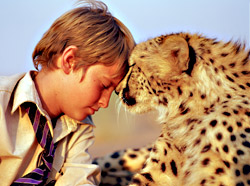There are two kinds of kids’ movies, it seems: the ones kids actually like, and the ones adults think they should like. I hope Duma—director Carroll Ballard’s latest in a line of well-reviewed family films that began with 1979’s The Black Stallion—falls into the former category. I’m sure I would have enjoyed it when I was 9. But Warner Bros., skittish about the box office potential of a film without flashy special effects in a Nintendo world, has been dribbling it out only in large cities—though a small army of charmed critics, with Roger Ebert at their head, has been agitating for its wider release. (Duma also begins a three-film Ballard retrospective at the NWFF; Stallion and Never Cry Wolf arrive April 9.)
Alex Michaletos plays Xan, a 12-year-old growing up on a South African farm with his parents (Campbell Scott and Hope Davis). They take in Duma, a stray cheetah cub, knowing they’ll eventually have to return him to the wild. Xan, resourceful and stoic, sets off to do this alone, leading Duma through terrain of stark and breathtaking beauty, hooking up with a drifter (Eamonn Walker from HBO’s Oz), and encountering dangerous wildlife from lions to tsetse flies. I know, it all sounds so Wonderful World of Disney, but Ballard displays impeccable restraint in matters sentimental, melodramatic, or cute (the opening sequence, in which baby Duma is orphaned and adopted, is exactly as poignant as it should be, but not one drop drippier), and all four actors give their characters a little welcome grit. (Five if you count Duma, who definitely has presence and a personality, though he’s actually played by several different cats.)
The photography is ravishing, with the dominant color a radiant gold: the African sunlight, the tall grasses, the desert soil, Duma’s pelt, and Michaletos’ hair. The film is beautiful, intelligent, good-hearted—and it doesn’t taste like broccoli. Its moral message, accepting change and respecting other ways of life, human or animal, is laid on gently.







